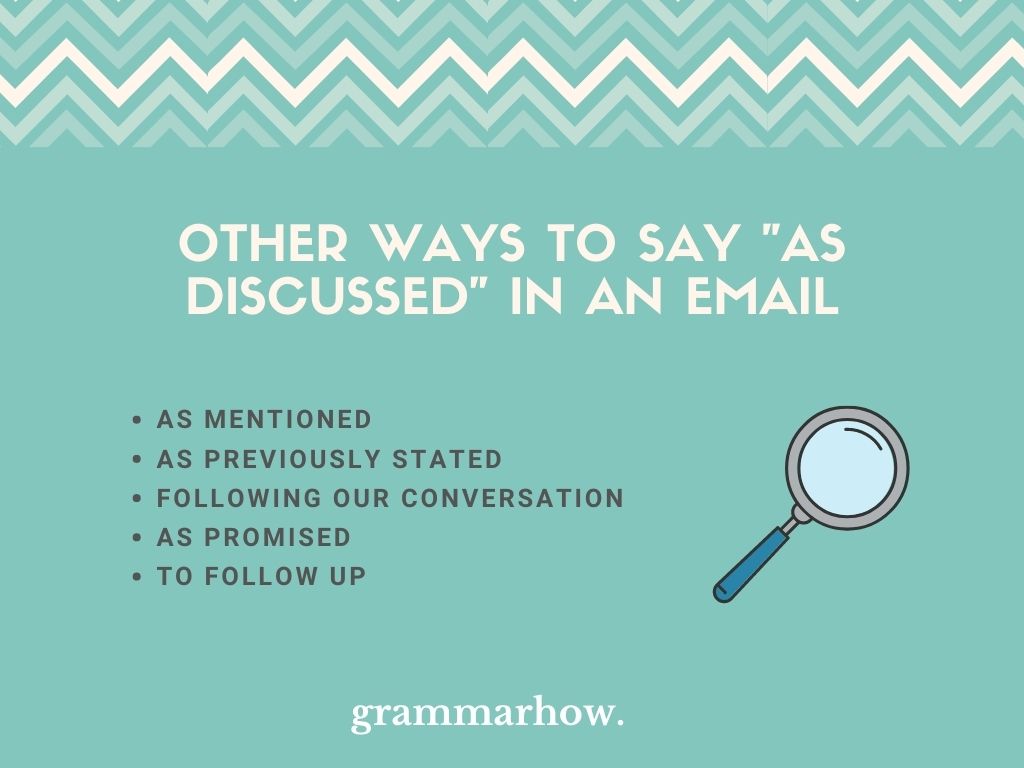
“As discussed” is fairly common in formal emails. It might help to know how to say “as discussed” in more polite ways. This article will explore some of the best alternatives you can use to replace “as discussed” in your emails. The best options include:
Other ways to say “as discussed” are “as mentioned,” “as previously stated,” and “following from our conversation.” These are the most effective synonyms for formal emails. They show that you’re highlighting something that’s already been mentioned to the email recipient.

When figuring out how to refer to a previous meeting in an email, “as mentioned” does the trick. It shows that someone has already mentioned something relating to the email’s context. It’s a great example of another way to say “as discussed.”
You should use this one when you’re confident someone should remember what you mentioned before. It shows that you trust them to remember something and want them to use that information going forward in the email.
“As previously stated” helps when thinking of what to say instead of “as discussed” as well. You should use it when something has already been “stated” by one of the parties in the email chain.
Often, this “statement” comes from an in-person discussion. It allows you to call back to an in-person briefing with somebody to let them know what information might relate to what you discussed.
“Following our conversation” shows that the email you send is a direct response or continuation of a previous conversation. It works best when you’ve previously spoken to someone about a work-related matter.
It shows that you have more to say and would like to discuss those matters with the person on the other end of the email.
“As promised” is a great synonym that’s a bit more specific than the others. It suggests you agreed to do something for someone and deliver on your “Promise.”
The implication here still suggests that you’ve previously discussed something with someone. However, you can only use “as promised” when that discussion ends with a promise or deal that you might have made with someone.
“To follow up” allows you to discuss further options after talking to someone in person or from a previous email. You may “follow up” when you want to add more information to the context that you might deem relevant.
It’s good to use this term in formal emails when you believe you have more pressing things to talk about. It shows that you’d like someone’s input on a situation before progressing.
“To continue our discussion” is great if you’re taking a previous in-person discussion into an email. It shows that you’re following up on something previously discussed in person and would like more information or input.
You should use this when you think you have more information to share with someone. It lets them know that you still want to discuss something before making any final decisions.
“I already told you” is a more direct way to remind someone that you said something. It shows that you’re not happy that they haven’t followed your original words because they did not listen to you.
You should only use a phrase like this as someone’s superior. It shows you are disappointed in them because you already told them what they needed to do.
“I already mentioned” is another direct statement showing you’ve already raised something with someone. This time, it doesn’t express disappointment as obviously.
Instead, you may use this phrase to show that you’ve already covered something for someone. It shows that they should be paying attention to the things you talk about to ensure they know what you’re referring to.
“This has already been covered” reminds someone that you’ve already spoken about something. It’s most effective when they’ve come to you with a question you think already has a suitable answer.
It doesn’t answer the question for them. Instead, you remind them to reflect on what was “covered.” This might help them come up with their own solution without your input.
“As you will remember” is a great alternative to use here. It suggests that someone will “remember” a topic or situation once you’ve discussed it briefly in an email.
This takes a lot for granted, though. It assumes that someone is comfortable enough with their memory to remind themselves of what you’re referring to. If they can’t remember, you might need to remind them anyway.
“As discussed” is very common in formal emails. It is not rude to refer to something previously discussed with the recipient.
However, it can be rude in certain situations.
For example, if you direct it to your boss in an email, it implies they are not living up to the things you’ve discussed. Some bosses might think you’re being cheeky or rude if used in the wrong context.
Likewise, if you’ve had a recent falling out with someone at work, “as discussed” could sound more sarcastic (even if you don’t mean it to come across that way).
To mitigate the sarcasm or rudeness, you might want to add “we.” This shows that both parties had an equal part to play in the discussion. For example:
Martin holds a Master’s degree in Finance and International Business. He has six years of experience in professional communication with clients, executives, and colleagues. Furthermore, he has teaching experience from Aarhus University. Martin has been featured as an expert in communication and teaching on Forbes and Shopify. Read more about Martin here.